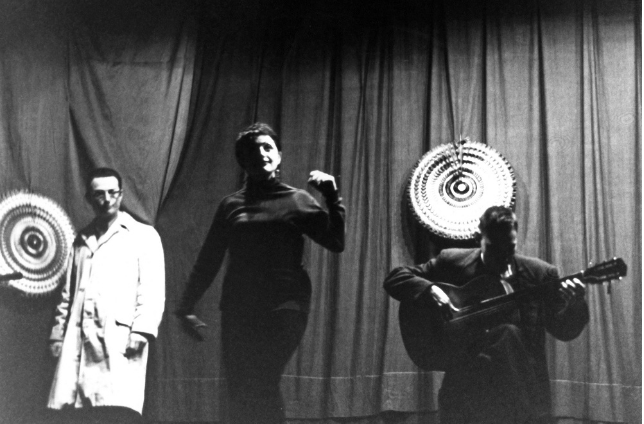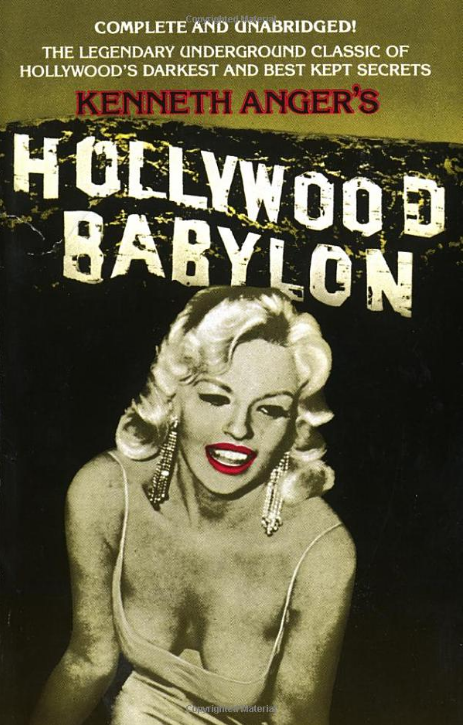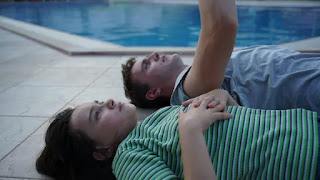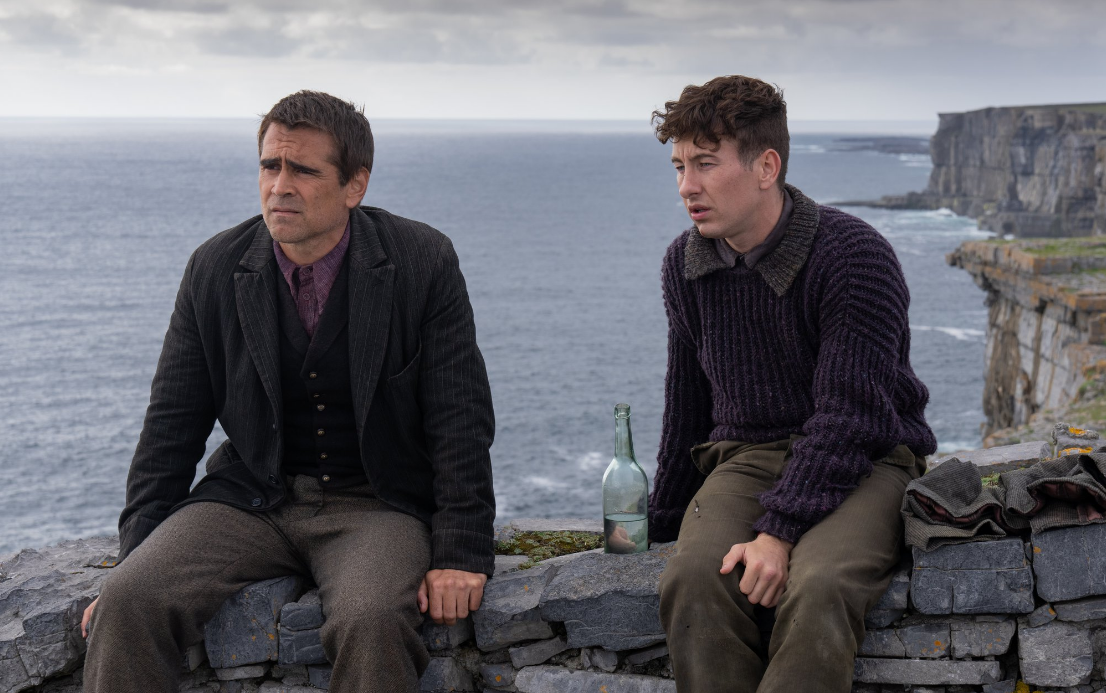Saturday, December 31, 2022
The Mystery of the Disappearing Pets in Kevin Tran's 2020 Debut The Dark End of the Street
Monday, December 26, 2022
Melody C. Miller profiles Poet Ruth Weiss in Lively 2019 Documentary The Beat Goddess
Friday, December 23, 2022
On the Fitzgeraldian Inspirations in Damien Chazelle’s Hollywood Spectacular Babylon
 |
| Margot Robbie looking more like a Halston model than a flapper |
 |
| De Niro and Ingrid Boulting in The Last Tycoon |
Sunday, December 11, 2022
Basketball Days and High Nights in Michael Schultz’s Exuberant Cooley High
Saturday, December 10, 2022
Simon Langton's The Whistler Blower: A Slow Burn Cold War Thriller with Michael Caine
Friday, November 25, 2022
DeepStar Six: Walking in the Outsized Footsteps of Ridley Scott's Alien
Friday, November 11, 2022
Dreaming of an Endless Summer in Aftersun
AFTERSUN
(Charlotte Wells, 2022, UK/USA, 98 minutes)
"Can't we just live in hotels for the rest of our lives?"--Sophie (Frankie Corio)
In her directorial debut, Charlotte Wells begins in the past with smeary, pixelated camcorder footage shot by 11-year-old Sophie (newcomer Frankie Corio in a naturally effervescent performance) who finds her dad's dance moves embarrassing. He is, she jokes, "130 going on 131."
For reasons unexplained, Calum's left wrist is in a cast, which has to be a drag while traveling in Turkey--or anywhere (he's played by Irish actor Paul Mescal of Normal People). Calum and Sophie's mother are divorced.
Vacation for these two--or "holiday" as they say in the UK--means hotel rooms, swimming pools, bus rides, chess matches, and mud baths.
Calum has enough of a youthful affect that a teenage pool shark assumes Sophie is his sister, and he does almost seem more like an older brother or an uncle. He can be silly and mischievous, but the occasional sober moment descends like a grey cloud, like when he tells a scuba instructor that he can't see himself at 40...and that he's surprised he even made it to 30.
Calum encourages Sophie to play with the younger kids at the hotel, but she prefers to play pool with the teen congregation, with the exception of Michael (Brooklyn Toulson), an age-appropriate boy with whom she plays a coin-operated motorbike game. When the teenagers flirt and make out with each other, she watches with avid curiosity. Later, she and Michael enjoy their own brief romantic moment, a first for the both of them.
Only towards the end of their stay does Calum's mood shift, possibly because he knows he won't be seeing his daughter every day anymore--even if they can exasperate each other--because Sophie lives in Scotland with her mother, while Calum relocated to England after their divorce.
Then again, it might have nothing to do with Sophie. It could be because his girlfriend returned to her ex-boyfriend or because their business venture fell apart as a result of her departure. It could be anything--it could be everything--but he rallies, and Sophie doesn't seem to notice, or acknowledge, that anything was amiss.Throughout the film, Wells inter-cuts strobe-lit scenes of Calum dancing at a rave. He dances at the beginning of the film, and he dances at the end, but these scenes combine past and present (Mescal also dances throughout the Rolling Stones' video for "Scarlet"). They're memories, not flashbacks, since they include images of the adult Sophie (played by dancer and choreographer Celia Rowlson-Hall) watching and even appearing to dance with her father, circa their late-1990s vacation.
 |
| The Lost Daughter / Netflix |
Not until afterward did I realize that Maggie Gyllenhaal's 2021 directorial debut, The Lost Daughter, sort of predicts Aftersun. Not intentionally, since one film draws from personal experience and the other draws from an Elena Ferrante novel, but it isn't hard to see why Paul Mescal sparked to Charlotte Wells's script after appearing in a previous film involving a conflicted parent, a broken marriage, and a continental European vacation.
In The Lost Daughter, however, he plays a summer hotel worker (not a dad), but he establishes a vivid connection with Olivia Colman's professor (a divorced mother of two), just as he did with Daisy Edgar-Jones's fellow student in Normal People, and just as he does with Frankie Corio in her first movie role (she's already got a followup project in the works).
In other words, Mescal has, of late, been gravitating towards projects involving intense male-female interactions. I'm sure that won't describe every project he takes on in the future, like an upcoming film with The Crown's Josh O'Connor, any more than it describes every project he took on in the past--including a theatrical career in Dublin—but striking parallels abound, including God's Creatures, the new film from Saela Davis and The Fits' Ana Rose Holmer predicated on the relationship between a mother (played by Emily Watson) and her estranged son (played by Mescal).
 |
| Normal People / Hulu |
Much like Normal People, Aftersun lives and dies by the chemistry between the two leads, and Mescal and Corio are never less than fully convincing as father and daughter.
If Calum is at a slight disadvantage as a character, it's simply because Wells presents him strictly through Sophie's eyes, except for one private moment that his daughter is unlikely to have witnessed. It helps to explain what's going on beneath the surface—the way parents can put on a brave face for their children—but I feel a little conflicted, because most everything else is mediated through her experience. And yet the film would make less sense without it.
Though I couldn't say whether Wells considers writer-director Barry Jenkins an influence, his production company, Pastel, shepherded her first feature film from page to screen. I do know that Jenkins has long claimed Claire Denis as an influence, and I would imagine Wells does, too, since she luxuriates in the sensual, abstract possibilities of half-open doors, muffled voices, translucent surfaces, and sunlight on sweat-dappled skin.
These images, captured on video and etched in her mind, help Sophie to remember her father: forever young, forever dancing--forever a mystery.
Aftersun is playing at the Meridian and AMC Seattle 10. Images from A24 (Paul Mescal and Frankie Corio) and Netflix (Mescal with Olivia Colman)
Saturday, October 29, 2022
Picturing Every Move That a Man Could Make in Gordon Lightfoot: If You Could Read My Mind
GORDON LIGHTFOOT: IF YOU COULD READ MY MIND
(Joan Tosoni and Martha Kehoe, 2020, Canada, naturally, 90 minutes)
If You Could Read My Mind, a production of the Canadian Broadcast Corporation, doubles as a documentary about both Gordon Lightfoot and the Canadian music scene that produced him.
The Lightfoot of today, with his rail-thin frame and long, lanky hair, doesn't look much like the robust, tousle-haired singer-songwriter who first came to fame in the 1960s. His mind is sharp, though, and he recalls his life's highlights and lowlights with clarity and humor in Joan Tosoni and Martha Kehoe's profile.
Lightfoot started out as a choir boy and barbershop quartet singer in the waterfront town of Orellia, Ontario before studying jazz composition in Los Angeles. Back home in Canada, he formed the Two-Tones, an Everly Brothers-style duo, but he wrote the songs, and tired of sharing the credit.
As a solo artist on Toronto's coffee house circuit, he impressed fellow folk artists, like Ian & Sylvia (Ian and Sylvia Tyson), who covered the title track and "(That's What You Get) for Lovin' Me" on 1965's Early Morning Rain.
Lightfoot also befriended Joni Mitchell, a Yorkville neighbor, who let him crash at her apartment when she would go on tour (Martin Scorsese includes footage of Lightfoot, Mitchell, and other musical luminaries jamming at her pad in his 2019 quasi-doc Rolling Thunder Revue: A Bob Dylan Story).
To his biographer, Canadian journalist Nicholas Jennings, Lightfoot's million-dollar record deal with Warner Brothers represented a breakthrough for Canadian artists, but the resulting album, 1970's Sit Down Young Stranger, attracted little attention outside of Canada until a Seattle disc jockey made a regional hit out of "If You Could Read My Mind." The label took notice. Though Lightfoot wasn't happy about it, they changed the album title to reflect the song, and the sales rolled in.As with "Early Morning Rain," several high-profile artists covered it, from Barbra Streisand to Johnny Cash. Lightfoot shares the stories behind others, like "The Wreck of the Edmund Fitzgerald," which drew from a real-life tragedy, and "That's What You Get," which drew from personal experience. Though it caught the attention of the country music establishment, Lightfoot believes it was disrespectful towards his first wife (he has remarried twice since then). "I didn't know what chauvinism was," he acknowledges.
To musicians like Geddy Lee of Rush, Lightfoot proved that Canada had more to offer the world than lumberjacks and hockey players. "We're capable of sensitivity and poetry." Randy Bachman of Bachman Turner Overdrive, meanwhile, praises his "smooth, honey kind of--velvet kind of voice."
While Mitchell and Neil Young would decamp to California, Lightfoot resisted the urge to follow that migratory path, helping to open the door for other Canadian vocalists, like Diana Krall and Sarah McLachlan, to reach a wider audience in subsequent decades.
Tosoni and Kehoe, who first met Lightfoot in the 1990s, also touch on his friendship with Dylan, his struggles with alcohol, and his tempestuous relationship with backup singer, music-biz scenester, and John Belushi associate Cathy Smith for whom he wrote cautionary ballad "Sundown."
If You Could Read My Mind joins the ranks of recent sensitively-drawn, well-constructed music documentaries about folk-rock peers Linda Ronstadt and David Crosby, who also found ways to stay relevant and energized years after their initial burst of fame. Recommended...not least since Lightfoot was the first artist I ever saw in concert, live at the West Anchorage High School auditorium (at the time, there really wasn't another suitable venue). Few major artists traveled to Alaska in the 1970s--but Gordon Lightfoot did.
Gordon Lightfoot: If You Could Read My Mind is available to stream for free through Plex, Pluto, Tubi, and Vudu, and on DVD (but not Blu-ray) from Kino Lorber. Images from USA Today / John Reeves (Lightfoot) and Amazon / Vanguard (Ian & Sylvia), and Place des Arts (Lightfoot in 2013).
Monday, October 24, 2022
Park Chan-wook's Decision to Leave: Investigating Murder for Business and Pleasure
Saturday, October 22, 2022
The Banshees of Inisherin and the Ireland of Martin McDonagh's Feverish Imagination
Friday, October 14, 2022
Claes Bang's Euro Vacation: The Bay of Silence
Thursday, October 13, 2022
On Apocalypse: A Bill Callahan Tour Film
This is a revived version of a Line Out post about Hanly Banks's 2012 documentary Apocalypse: A Bill Callahan Tour Film (these posts were purged from the internet after The Stranger pulled the plug on their music blog).
Apocalypse: A Bill Callahan Tour Film
APOCALYPSE: A BILL CALLAHAN TOUR FILM
(Hanly Banks, USA, 2012, 60 minutes)
Instead of a conventional documentary, this concert film captures the singer/songwriter on one tour in support of one album, 2011's Apocalypse (I caught his Seattle stop at Neumos with Michael Chapman; it was great).
Of course, there's nothing particularly unusual about a concert film, except Callahan's been around long enough that some fans might welcome the opportunity to get to know him better or to hear a few older songs.
For an artist who wants to showcase their most recent work while maintaining their privacy, however, it's the way to go. As he sings in "America!," one of his finest songs to date, "Everyone's allowed a past they don't care to mention."
Instead, the director combines songs with glimpses of the towns Callahan visited. Filled with twang, reverb, and the seersucker suit-clad subject's unvarnished baritone, Apocalypse offers a noirish take on Americana, like Scott Walker playing with Calexico, and the shots of farms, forests, and factories suit the material.
Nonetheless, the emphasis remains on Callahan and his band (guitarist Matt Kinsey and drummer Neal Morgan), and Hanly Banks neatly stitches together different domestic performances. One minute, Bill is wearing sunglasses, the next he's not. One minute, he's outside under the stars, the next he's not. It isn't as distracting as it sounds, but I'm also pretty accustomed to the technique by this point.
Hanks, a former Fader contributor, has designed the film more for listening to the music and meditating on the imagery than for thinking about Callahan's background and how it relates to his discography. If he talks about writing and touring, he avoids specifics, concluding that he's never more "real" than when he's on stage.
In the end, Apocalypse belongs to the impressionistic, About a Son school of filmmaking, which is both its biggest strength and its biggest weakness. Even the latest John Mellencamp DVD, It's About You, takes this approach; in fact, the two releases are strikingly similar, even if one guy's an FM mainstay and the other's an indie stalwart. If I prefer this film, that's mainly because I prefer Bill Callahan.
Apocalypse opens at the Grand Illusion on Fri, 9/7, at 7:30pm.







































